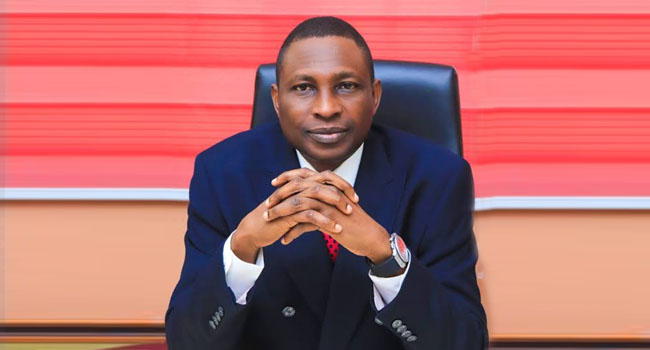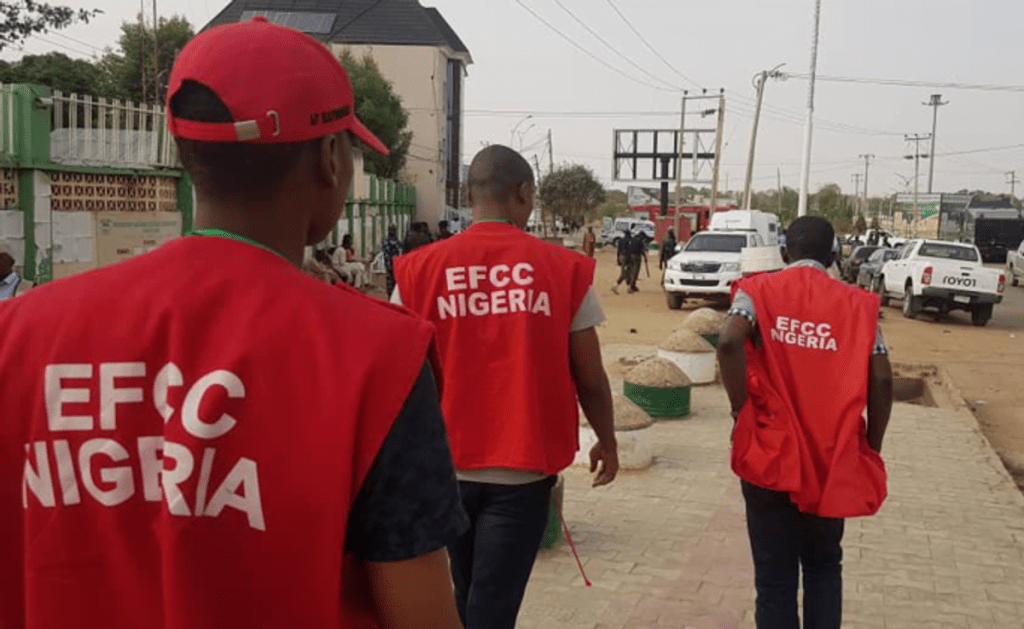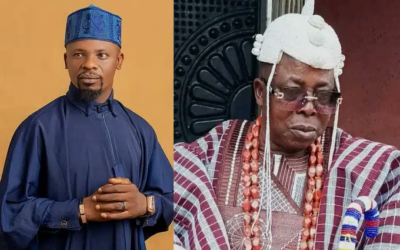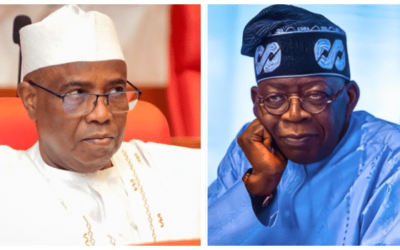
EFCC Urges National Assembly To Criminalise Unexplained Wealth

The Economic and Financial Crimes Commission has called on the National Assembly to make a law criminalising unexplained wealth and fortune in the country.
The commission stated that the country successfully waged the war against corruption without legal backing to hold public officers accountable for assets far beyond their legitimate earnings.
The Chairman of the Commission, Ola Olukoyede, made the call on Wednesday while speaking at the National Conference on Public Accounts and Fiscal Governance organised by the Public Accounts Committees of the Senate and House of Representatives in Abuja.
He also revealed that the EFCC had only just begun examining the books of the Nigerian National Petroleum Company Limited, and what had emerged so far is difficult to believe.
“Help me pass the Unexplained Wealth Bill. I’ve been begging for the past year. This same bill was thrown out in the last Assembly. If we don’t make individuals accountable for what they have, we’ll never get it right.

“Someone has worked in a ministry for 20 years. We calculate their entire salary and allowances. Then we find five properties — two in Maitama, three in Asokoro. Yet we’re told to go and prove a predicate offence before we can act. That is absurd.
“In the last three weeks, we started a commission-wide investigation into the extractive industry, particularly the oil and gas sector. What we have discovered is mind-boggling. We have only just opened the books. So much more corruption is to be unravelled. If this is what we’re seeing at the surface, imagine what lies beneath,” he said.
The EFCC boss said the discovery underscores how deeply embedded financial mismanagement is across the system, calling fiscal rascality and mismanagement of public resources a core driver of Nigeria’s economic woes and security challenges.
“There is a very strong connection between the mismanagement of our resources and insecurity. When you look at banditry, kidnapping, terrorism, trace it back, and you will find a pattern of corrupt practices and diversion of funds that were meant to improve people’s lives,” he said.
He decried the legal impediments hindering the Commission’s ability to prosecute suspects.
He recounted how investigations into public officers often stall because the law still requires a “predicate offence”, a specific crime such as theft or fraud, before assets can be seized or charges filed.
The proposed law, he added, would make it a strict liability offence for any individual to possess assets grossly beyond their known and legal income sources.
“Once you are living beyond your means, you should be held to account. Until we do this, there will always be an escape route for the corrupt,” he said.
Olukoyede revealed a disturbing global perception of Nigeria’s looted wealth, noting that the EFCC is currently tracking illicit assets across multiple jurisdictions, from America and Turkey to the most unexpected locations like Iceland.
“Last month alone, I visited four or five countries chasing Nigeria’s stolen assets. An ambassador even told me they discovered an estate in Iceland owned by a Nigerian. Iceland of all places!” he said.
The EFCC boss admitted that no anti-graft agency, no matter how efficient, can recover more than half of what has been looted from the nation’s resources.
“There is no amount of capacity I can build, no level of effort I can put in, that will enable me to recover even half of what has been stolen from Nigeria because the custodians of those assets in foreign countries don’t want to let go. And they won’t,” he said.
Olukoyede also chided hoarders of looted funds, saying, “I told them at the United Nations Forum last December that if you are holding onto Nigeria’s stolen assets, we see you as an accessory after the fact. They grumbled, but I didn’t care,” he said.
He also faulted the widespread culture of impunity in Nigeria’s public service, where those already under prosecution are often celebrated, and compliance with financial laws is flouted with impunity.
“We are doing this work. We see people who have stolen our money. We have shown you evidence. We’ve traced where the money went. We are already in court. Yet, they’re being celebrated all over the place. Does that show we’re serious?
“If we execute even 60% of our capital budget efficiently between 2025 and 2026, we will empower small and medium-scale industries. We’ll build infrastructure. We’ll be fine,” he said.
He emphasised that Nigeria has no business borrowing to survive, given the abundant natural and mineral resources in the land.The Economic and Financial Crimes Commission has called on the National Assembly to make a law criminalising unexplained wealth and fortune in the country.
The commission stated that the country successfully waged the war against corruption without legal backing to hold public officers accountable for assets far beyond their legitimate earnings.
The Chairman of the Commission, Ola Olukoyede, made the call on Wednesday while speaking at the National Conference on Public Accounts and Fiscal Governance organised by the Public Accounts Committees of the Senate and House of Representatives in Abuja.
He also revealed that the EFCC had only just begun examining the books of the Nigerian National Petroleum Company Limited, and what had emerged so far is difficult to believe.
“Help me pass the Unexplained Wealth Bill. I’ve been begging for the past year. This same bill was thrown out in the last Assembly. If we don’t make individuals accountable for what they have, we’ll never get it right.
“Someone has worked in a ministry for 20 years. We calculate their entire salary and allowances. Then we find five properties — two in Maitama, three in Asokoro. Yet we’re told to go and prove a predicate offence before we can act. That is absurd.
“In the last three weeks, we started a commission-wide investigation into the extractive industry, particularly the oil and gas sector. What we have discovered is mind-boggling. We have only just opened the books. So much more corruption is to be unravelled. If this is what we’re seeing at the surface, imagine what lies beneath,” he said.
The EFCC boss said the discovery underscores how deeply embedded financial mismanagement is across the system, calling fiscal rascality and mismanagement of public resources a core driver of Nigeria’s economic woes and security challenges.
“There is a very strong connection between the mismanagement of our resources and insecurity. When you look at banditry, kidnapping, terrorism, trace it back, and you will find a pattern of corrupt practices and diversion of funds that were meant to improve people’s lives,” he said.
He decried the legal impediments hindering the Commission’s ability to prosecute suspects.
He recounted how investigations into public officers often stall because the law still requires a “predicate offence”, a specific crime such as theft or fraud, before assets can be seized or charges filed.
The proposed law, he added, would make it a strict liability offence for any individual to possess assets grossly beyond their known and legal income sources.
“Once you are living beyond your means, you should be held to account. Until we do this, there will always be an escape route for the corrupt,” he said.
Olukoyede revealed a disturbing global perception of Nigeria’s looted wealth, noting that the EFCC is currently tracking illicit assets across multiple jurisdictions, from America and Turkey to the most unexpected locations like Iceland.
“Last month alone, I visited four or five countries chasing Nigeria’s stolen assets. An ambassador even told me they discovered an estate in Iceland owned by a Nigerian. Iceland of all places!” he said.
The EFCC boss admitted that no anti-graft agency, no matter how efficient, can recover more than half of what has been looted from the nation’s resources.
“There is no amount of capacity I can build, no level of effort I can put in, that will enable me to recover even half of what has been stolen from Nigeria because the custodians of those assets in foreign countries don’t want to let go. And they won’t,” he said.
Olukoyede also chided hoarders of looted funds, saying, “I told them at the United Nations Forum last December that if you are holding onto Nigeria’s stolen assets, we see you as an accessory after the fact. They grumbled, but I didn’t care,” he said.
He also faulted the widespread culture of impunity in Nigeria’s public service, where those already under prosecution are often celebrated, and compliance with financial laws is flouted with impunity.
“We are doing this work. We see people who have stolen our money. We have shown you evidence. We’ve traced where the money went. We are already in court. Yet, they’re being celebrated all over the place. Does that show we’re serious?
READ ALSO: EFCC Arrests 34 Suspected Internet Fraudsters In Ekiti
“If we execute even 60% of our capital budget efficiently between 2025 and 2026, we will empower small and medium-scale industries. We’ll build infrastructure. We’ll be fine,” he said.
He emphasised that Nigeria has no business borrowing to survive, given the abundant natural and mineral resources in the land.









